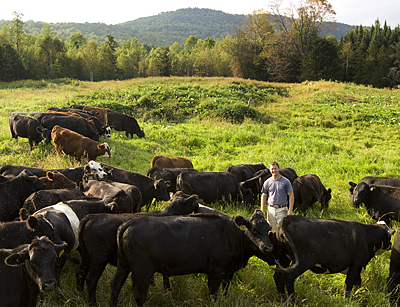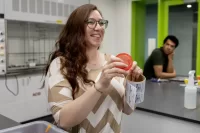The Maine Course

Gabe Clark '02, with his wife, Amanda Waterhouse Clark '02, raise grass-fed beef on their farm in North New Portland, Maine.
The Bates Contemplates Food initiative is a call for an informed examination of food choices. For many of us, these choices involve what foods to buy. A select few, though — such as the alumni on enumerated below — are choosing what foods to produce for the people who buy.
And while every food decision is a life decision, the choices made by people whose livings depend on producing food take place on planes different from the ones we occupy.
At one extreme, there’s the importance of dirt. Dirt is furthest from your mind when you tuck into a sustainable, made-in-Maine dinner of grass-fed beef from Cold Spring Ranch and organic salad from Hackmatack Farm.
But for Gabe Clark ’02, whose cattle thrive on Cold Spring Ranch grass, and vegetable grower Nicolas Lindholm ’86, dirt is all important. Soil quality can make or break their products.
“It’s taken me years to realize that I don’t need to put so much attention toward growing the tomato plant,” says Lindholm. “I put my attention toward growing healthy soil, and the tomato plant just comes along very happily on its own.”
Then there’s the macro view. By choosing to work in Maine, Jason Perkins ’97 and the husband-wife team of Tim Kane ’82 and Beth George ’85 have engaged in a conflict that conscientious consumers face every day: what’s desirable vs. what’s local.
Perkins is brewmaster for Allagash, a popular craft beermaker. Kane and George run a bakery dedicated to the unusual grain called spelt. Both businesses can legitimately claim to be “local” and “sustainable.” And yet: Allagash brings in hops and malted barley from across the U.S.; Canada and the Midwest produce the spelt for George and Kane’s business.
Neither Perkins nor the Spelt Right bakers want to rely on supplies shipped long distances, with the attendant carbon emissions and loss to the local economy. All are actively seeking Maine sources.
But in the meantime, they negotiate daily a thicket of complex food questions, just like the rest of us — except for the rest of us, the quantities aren’t in tons and livelihoods aren’t at stake.
So, if you need a break from your own food choices or a new perspective on them, meet this group of Batesies whose most important food choice has been simply (but not so simply) to produce it in Maine.
Photographs and reporting by Phyllis Graber Jensen
Text and reporting by Doug Hubley


